- Home
- Tim LaHaye
Black Friday Page 6
Black Friday Read online
Page 6
First, there was the phone call from Maryland in which his lawyer had reported another legal setback. No, it was much more than a setback, and he knew it. He’d been blindsided by a bombshell. He replayed the conversation, still fresh in his mind, for the third time.
“Victor, the prosecutor has added additional charges—”
“Now what?”
“Criminal negligence and reckless endangerment.”
He swore. “Based upon what?”
“New evidence—”
Dr. Graham swore again. “From where? Where are they getting this stuff ? I thought we hid everything.”
“We did. I personally shredded the files you instructed me to dispose of—unless . . . have you considered that there may be a leak in your office?”
“Not a chance,” Dr. Graham had said.
“Victor, what about a plea-bargain agreement? I could—”
“Wait. Tell me first, what’s the worst-case scenario if this goes to a full trial?”
“A hefty fine—maybe in the five figures, plus a probation period.” His lawyer had spoken the words in a monotone, as if reporting the weather.
“What about jail?”
The only comfort Dr. Graham took from his morning conversation was to hear his lawyer say, “No jail time.”
“Then, no deals,” Dr. Graham had said.
“Even if the fine is substantial—”
“I won’t negotiate with those thieves. If it comes down to it, I’ll pay their lousy fine. But no deals.”
Dr. Graham blinked and noticed he was choking the empty glass in his hand. He set it down on the desk before continuing to rehearse the events of the day.
As it turned out, his lawyer’s bad news was just the appetizer. The dreadful appearance of Gus, who’d materialized in his office out of thin air like the ghost of Jacob Marley haunting old man Scrooge, really took the cake.
At first, he couldn’t bring himself to open Gus’s letter. The white, badly stained envelope had sat on his desk for the better part of twenty minutes. He had to fortify his nerves. With two additional glasses of Scotch whiskey down the hatch, he finally found the will to tear into the note.
By the time he had reached the end of the document, he was paralyzed with a fear he could almost taste. The last thing Dr. Graham needed was Gus rattling these chains from his past.
Not here. Not now.
To make matters worse, his right hand, plagued by that wretched muscular tremor, shook like a leaf in the wind most of the afternoon. Even Jenna had said it would do him some good to take the night off.
Maybe she was right. Perhaps a drive and some fresh air would clear out the cobwebs and, hopefully, chase away the ghosts. Dr. Graham checked the time. In thirty minutes he could be boatside. The thought appealed to him. He pressed a button for the intercom.
“Jenna?”
“Yes, Doctor?”
“I’m taking off now,” Dr. Graham said. “Close the place up for me.”
“Yes, sir. There’s one more item.”
Dr. Graham started to clear his desk. “What is it?”
“I need to remind you we’re getting short-handed again. We lost several team members over the weekend.”
He shook his head. He hated dealing with personnel hassles, especially hiring new people. The initial turnover rate was higher than the average in other professions. In his case, Dr. Graham knew a trainee had to make it through the first week of orientation. Most didn’t. And some cried. He had zero patience for a new team member who got too emotional. What did they expect when they applied? This was a high octane environment.
Deal with it.
The cool-headed ones, those in the freshman batch who made it through the first seven days, had five additional weeks of training. If they got that far, Dr. Graham knew the odds were in his favor they’d be on his team forever.
Like Jenna.
“Then just get them replaced.”
“Sir, you usually—”
“Jenna,” he said. He stopped to soften his delivery. “As of this minute, you handle it for me. I trust you.”
“Thank you. Have a nice evening.”
Dr. Graham lingered by the phone for a long second before leaving his desk. He took the back staircase down one f light of stairs and then stepped outside his office building, a modern two-story, brick-and-glass facility. He headed for his reserved parking space, his stride long and purposeful. Like everything he did, he moved at a frenzied pace, even now when he was supposed to be relaxing.
He prided himself on being a man with the energy of a tornado, always in a state of constant motion. When questioned by his employees about his unrelenting intensity, he loved to say, “Better to burn out than to rust out.”
If he hadn’t dropped his keys on the pavement as he raced to his car, he wouldn’t have slowed enough to appreciate the colorful display overhead. The sun lay low in the evening sky, splashing bursts of yellow and burnt orange across the horizon.
He picked up his wad of keys and, with a beep, unlocked the car door. He slipped into the leather bucket seat behind the wheel of his red, Z-06 Corvette, put the top down, and then jammed the appropriate key into the ignition. Yes, fresh air and some distance from this place were what he needed.
Dr. Graham fired up the 405 V-8 high-performance engine. Like a juvenile in high school, he peeled out of the parking lot, hoping Jenna was watching. He could drive to Pete’s Marina adjacent to Philadelphia’s historic district in his sleep, and sometimes did.
He had picked this center-city marina because of its proximity to Society Hill, the bustle of South Street, and the prominence of Independence Hall. Not that he ever took the time to enjoy the shops, the galleries, the clubs, or the historical sites.
For him, it was a matter of image and status. His sixty-five-foot, state-of-the-art yacht, with “Total Choice” hand-painted across the bow, could be seen from both Penn’s Landing and the Ben Franklin Bridge. The year-round access to the luxuries his boat afforded was an added bonus.
He stomped on the gas. The thirsty engine snarled as it shot the Vette, like an arrow, into the stream of traffic on Street Road. He found the night air against his skin invigorating. He breathed deeply.
Yes, Jenna was right.
This was the ticket. This, and an evening spent preparing the yacht for tomorrow’s dinner.
One block before he hit the on-ramp for I-95 South, traffic stopped at a light. He reached down and tuned in his favorite radio station, a commercial-free satellite network playing nothing but the Beatles. The chorus from “Lucy in the Sky with Diamonds” filled the speakers.
When he looked up, a man pushing a shopping cart along the side of the road caught his attention. His heart flew into a rage.
Gus?
He squinted and then kicked himself for being so jumpy.
The light changed, and he tore down the road.
As he headed south, the city lights twinkled in the distance. The Beatles started to sing “All you need is love.” He, in turn, started to replay the vision of Jenna’s delight when he invited her to join him and several other guests on his boat Wednesday night. Her thick, red lips seemed to shimmer with desire as she said, “That would be nice.”
He wondered what she would wear.
He certainly knew what he wanted her to wear.
He pictured her in a skimpy, low-cut gown with a long slit riding high up her leg. His daydream was cut short when his headlights cast a bluish-white beam on a homeless man slumped against the base of a bridge.
His thoughts returned to Gus.
Gus was a wild-card threat, of that he was certain. And while Gus might have appeared like an unstable homeless drifter, Dr. Graham knew Gus was probably still sharp as a tack under those layers of dust and scum. Left unchecked, Dr. Graham knew he could lose everything. His business, his home, his reputation, his dreams.
All because of Gus.
Why couldn’t Gus mind his own business? Why did he insist on nos
ing around in matters that were no longer his concern? Sure, they had been partners. But that was a lifetime ago.
Why did Gus back him into a corner with that letter?
If the old fool insisted on his course of action, Dr. Graham knew he would be ruined. At least in the Philadelphia area.
Sure, he could always move out of state if things heated up. He had done it before. Run, cut your losses, and live to fight another day, he thought. But he enjoyed his new, custom-built home overlooking a golf course. His yacht. His slice of the good life.
And Jenna.
Although there wasn’t anything romantic between them, at least not yet, the prospect of moving somewhere without her—all because of Gus—enraged him. What right did Gus have to jeopardize his relationship with Jenna?
Dr. Graham swore under his breath. He pounded the steering wheel at the thought. He refused to have everything taken away because a homeless man armed with a ten-year-old vendetta appeared in his backyard.
No. He wouldn’t let that happen.
The simplest solution was to take Gus out of the game. Permanently. No ghostlike encore. No way back.
The more he thought about it, the more Dr. Graham knew he had no choice but to act, and soon. Who could blame him for defending himself against a crazy man? Gus had brought this on himself with that asinine letter. Period.
As he drove, the thought of eliminating Gus seemed almost . . . comforting.
Who would notice that there was one less vagrant?
After all, for Dr. Graham, killing was a way of life.
Chapter 10 Tuesday, 7:22 p.m.
Jodi handed the gas station attendant a five-dollar bill. She jumped back into her car, clicked on her seat belt and started the engine. “Sorry about the delay of game. I didn’t realize I was, like, running on fumes.” She f lipped her hair over her shoulder.
“Hey, it’s your crisis,” Stan said with a laugh.
“Tell me about it,” Jodi said. She pulled into traffic. In her rearview mirror, she noticed Heather gazing out the side window. “Whatcha thinking?”
“Me?” Heather said. “Oh, I’m still, like, shocked by all that stuff you said was in Gus’s letter.”
Jodi nodded. “I feel the same way. Now can you see that’s why I . . . we’ve . . . got to get it?”
“How do we get in?” Stan said. “Want me to break a few windows?”
“As if,” she said. “The janitors will let us in. I’m pretty sure they’re there until 7:30-ish.”
Heather leaned forward. “In that case, we’ll be late.”
Jodi, stepping on the gas, glanced at Heather in her mirror. “What makes you say that?” Jodi was a careful driver, but she could lean on the skinny pedal with the best of them if, say, angry Russian mobsters were on her tail, as had been the case a month ago.
“Your clock, right there,” Heather said, pointing to the dash. “It says 7:28. We’ll never make Easton Road in two minutes.”
“Gosh, you scared me,” Jodi said, her foot still heavy on the pedal. “That clock is fast by five or six minutes so I’m not late to stuff.”
“You’re kidding, right?” Stan said. “That would never work for me. I’d be like—”
“Hey, whenever you two are done blabbing . . . I just want to say I hope this Gus guy is wrong,” Heather said.
“Really?” Jodi said. She slowed the car for a red light. “Why is that?”
“I don’t know. Sometimes the truth is, like, too painful to face,” Heather said. “I’d kinda rather believe a lie, or, actually, I’d, like, not want to know about something rather than know that stuff is really going on. Make sense?”
“You’ve lost me,” Jodi said, looking back again. “What are you afraid of ?”
“Look, if Gus is right, then something major ought to be done about it, see?” Heather said.
Stan turned halfway around in the front seat. “Right. It’s like if I found out our football scores had been rigged all season. Who wants to think Coach Thomas was fixing our games because he’s, like, part of some secret gambling racket.”
“Exactly,” Heather said, squeezing Stan’s shoulders once.
“Wow, Heather, I’ll give you a half-hour to stop that,” Stan said with a smile. “Like I said, if that were true—about Coach Thomas— and I found out, I’d have to do something about it.”
“Yeah, Jodi,” Heather said. “‘Ignorance is bliss.’”
“Okay. I guess that’s where maybe I’m wired a little differently,” Jodi said. She turned right onto Easton Road. “If this stuff were going on and I knew it, then I’m pretty sure God would want me to, like, expose it for what it is.”
“Wait a minute,” Stan said. “How do you know that?”
Jodi smiled. “I happen to have memorized the verse just lately. It’s Ephesians 5:11—‘Have nothing to do with the fruitless deeds of darkness, but rather expose them.’”
“Whoa—isn’t that your building?” Heather asked.
Jodi hit the brakes. Her tires squealed in protest. She snapped on her turn signal to cross into the parking lot. “Arrg! I did the same thing this morning.”
Easton Road, which ran north and south through the northeast suburbs of Philadelphia, was a stretch of four undersize lanes. Jodi had to cross two lanes of traffic. The oncoming traffic whizzed by inches from her door.
“Hey, we’re in luck,” Stan said. “Looks like the janitors are just leaving.”
The traffic was heavy. With her left hand, Jodi shielded her eyes against the sun as she watched for a hole in the crowd of cars to make her turn. Her right hand squeezed the steering wheel as a knot of tension formed in her stomach. “Come on, people.”
Stan pointed. “Um, Jodi, they’ve locked the door.”
“I can’t get across—” Jodi thought she had a break, started to make the turn, then jerked to a stop. “I hope you get a ticket, buster,” she said to a hopped-up Jeep with oversize tires. As the Jeep passed by, the bass heavy thump of rap music rattled their windows.
“Jodi!” Heather said.
“Well—the creep was speeding,” Jodi said.
Stan leaned over for a better view. “I hate to say it, but now they’re getting into their van.”
Jodi’s heart clapped away in her chest. She had to get there. She figured she’d be able to sweet-talk the janitors into opening the door for her. She’d only need a minute. The blinking of her turn indicator ticked away the seconds.
She heard Stan unlocking his door.
“Stan! Are you crazy?” Jodi said.
“Well, they’re heading down the back alley,” Stan said. “I’ll run—”
“If I can’t cross, you can’t either . . . hold on!” Jodi said, getting the break she needed. “Finally.” She peeled across the two lanes.
“You go, girl,” Stan said.
The Mazda zipped into the parking lot. Seconds later, with the building to her right and a row of thick pine trees to her left, she had a clear view of the alley. Jodi stopped the car.
“I’m so sure . . . they’re gone.” Jodi’s heart pounded.
Heather leaned forward. “Now what, Speed Racer?”
This time, Stan opened his door and stepped out. “Maybe there’s an unlocked window or something. I’ll check.”
Jodi just shook her head. She knew even if Stan could find a way into the building, for them to go in would cross a line. They’d be breaking and entering. That wouldn’t be cool. She could get fired, or worse, fined. She pushed the gearshift into park, lowered the windows, and shut off the engine.
“What gives?” Heather said, placing a hand on Jodi’s shoulder.
Jodi unfastened her seat belt. “This isn’t right. I can’t just, like, waltz in there now. We’re too late.” As Joey would say, “End of story,” she thought.
Heather sat back. “Well, what if we were to check out the Dumpster—”
“We could try, but I can’t say for sure that Joey threw away the letter,” Jodi said. “Maybe he p
ut it on his desk, or maybe he filed it in the nut-case file. We should just forget about it.” Discouragement, like a thick fog, settled over her.
“There’s Stan, jogging around the edge of the building,” Heather said, pointing.
Jodi leaned an arm out her window. “Let’s go, Stan.”
Stan sprinted toward the driver’s side of the car. He hunched down by Jodi’s window. “Everything’s locked. But—”
“Thanks for trying,” Jodi said.
Heather gasped in the backseat.
“Try, try. All we can do is try.”
Jodi spun to her right at the sound of a familiar voice. Gus stood just outside Heather’s door, between the car and the grove of pine trees.
“Hey, Gus,” Jodi said, now leaning across Stan’s seat. “Guys, this is the man I was telling you about.”
Gus turned as if to leave.
“No-no-no! Don’t go,” Jodi said.
Gus turned back around and then looked at Jodi, his eyes distant. “Are these . . . the wrong people?”
“Gus—believe me. They’re as right as they come,” Jodi said. “I told them about your letter.”
His head twitched to the left, and then the right. He reached for his beard.
Think quick, Jodi thought. “Hey, maybe we could go talk somewhere . . . with you. How about we have coffee?”
“Go talk somewhere, with you,” he repeated. “I could talk. To the right people, I could talk.”
Stan walked around the front of the car and opened the passenger’s side door. “Have the front seat, my man,” Stan said.
The wrinkles at the edge of his eyes smoothed out as a smile found its way through the bushy beard. He shuffled toward the car.
“I know a really cool place, Gus,” Jodi said. “Hop in.”
Chapter 11 Tuesday, 7:44 p.m.
Gus, order whatever you’d like,” Jodi said, placing her purse at her side on the red vinyl seat. “It’s my treat.”
Gus stared at her, his eyes distant as if he had heard a new word and was processing the meaning. “Treat. Yes, treats are good. Thank you, missy.”

 Glorious Appearing: The End of Days
Glorious Appearing: The End of Days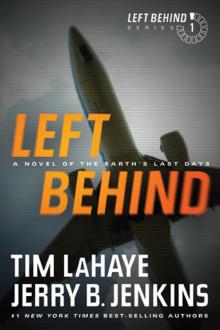 Left Behind: A Novel of the Earth's Last Days
Left Behind: A Novel of the Earth's Last Days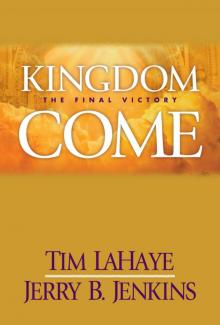 Kingdom Come: The Final Victory
Kingdom Come: The Final Victory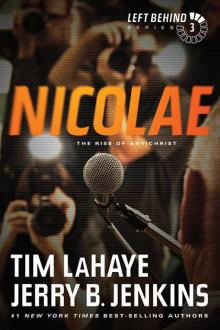 Nicolae: The Rise of Antichrist
Nicolae: The Rise of Antichrist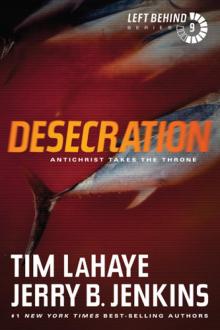 Desecration: Antichrist Takes the Throne
Desecration: Antichrist Takes the Throne Mark's Story: The Gospel According to Peter
Mark's Story: The Gospel According to Peter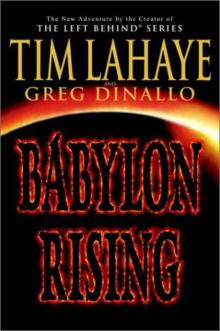 Babylon Rising
Babylon Rising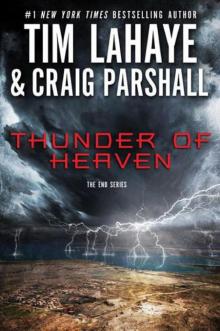 Thunder of Heaven: A Joshua Jordan Novel
Thunder of Heaven: A Joshua Jordan Novel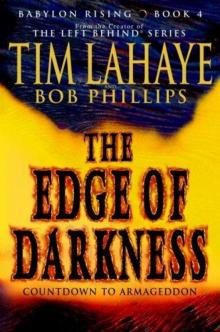 The Edge of Darkness
The Edge of Darkness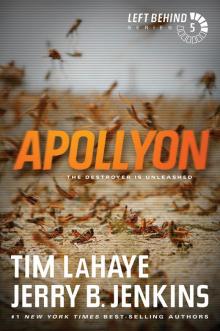 Apollyon: The Destroyer Is Unleashed
Apollyon: The Destroyer Is Unleashed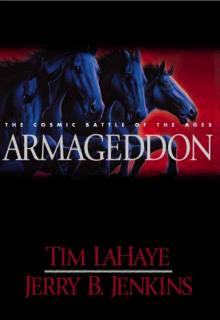 Armageddon: The Cosmic Battle of the Ages
Armageddon: The Cosmic Battle of the Ages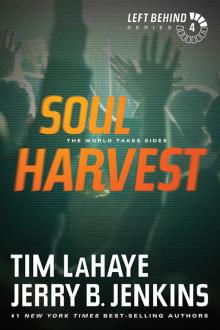 Soul Harvest: The World Takes Sides
Soul Harvest: The World Takes Sides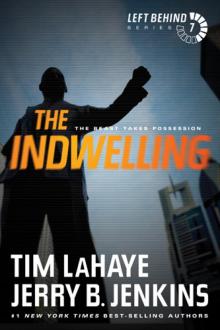 The Indwelling: The Beast Takes Possession
The Indwelling: The Beast Takes Possession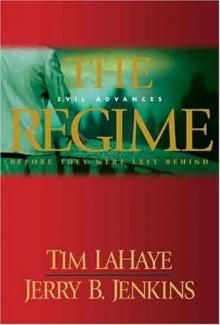 The Regime: Evil Advances
The Regime: Evil Advances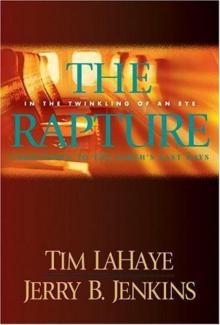 The Rapture: In the Twinkling of an Eye / Countdown to the Earth's Last Days
The Rapture: In the Twinkling of an Eye / Countdown to the Earth's Last Days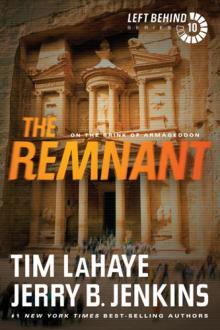 The Remnant: On the Brink of Armageddon
The Remnant: On the Brink of Armageddon John's Story: The Last Eyewitness
John's Story: The Last Eyewitness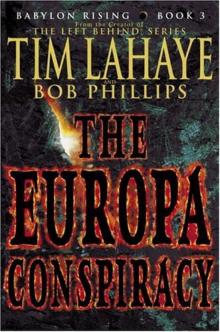 The Europa Conspiracy
The Europa Conspiracy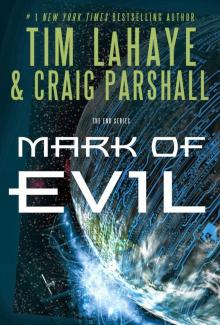 Mark of Evil
Mark of Evil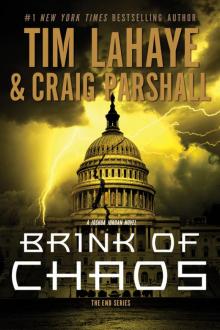 Brink of Chaos
Brink of Chaos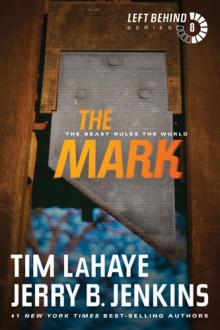 The Mark: The Beast Rules the World
The Mark: The Beast Rules the World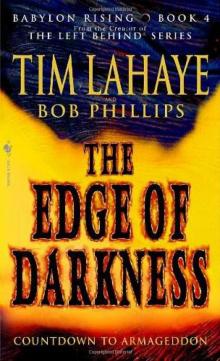 04 The Edge of Darkness
04 The Edge of Darkness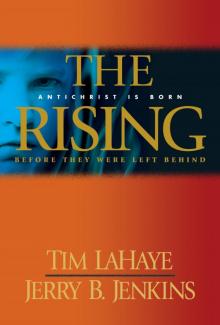 The Rising: Antichrist is Born / Before They Were Left Behind
The Rising: Antichrist is Born / Before They Were Left Behind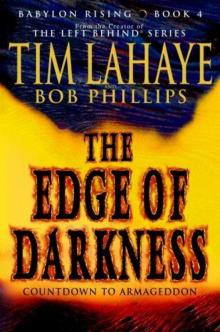 Babylon Rising: The Edge of Darkness
Babylon Rising: The Edge of Darkness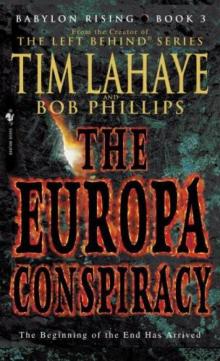 03 The Europa Conspiracy
03 The Europa Conspiracy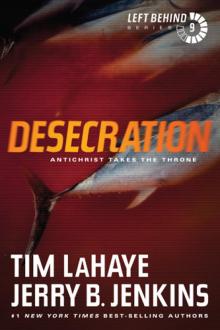 Desecration
Desecration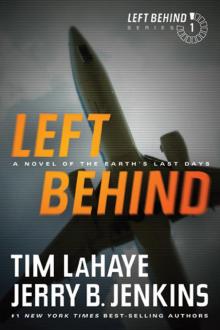 Left Behind
Left Behind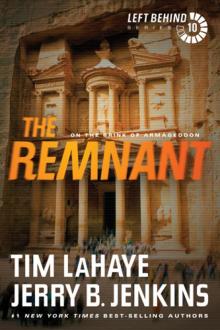 The Remnant
The Remnant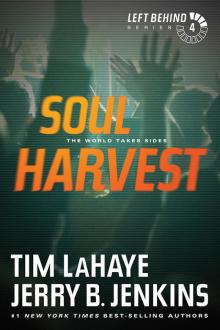 Soul Harvest
Soul Harvest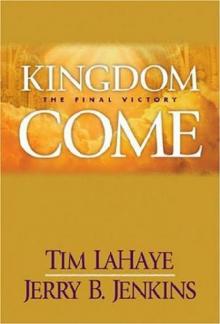 Left Behind Book 13: Kingdom Come The Final Victory
Left Behind Book 13: Kingdom Come The Final Victory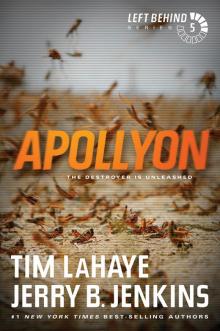 Apollyon
Apollyon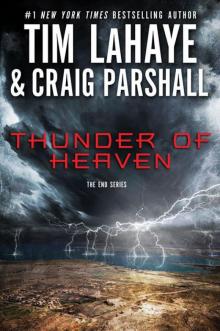 02 Thunder of Heaven: A Joshua Jordan Novel
02 Thunder of Heaven: A Joshua Jordan Novel Glorious Appearing
Glorious Appearing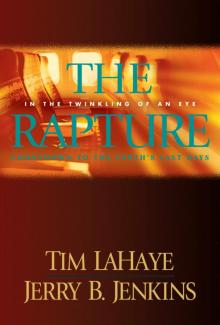 The Rapture: Evil Advances / Before They Were Left Behind
The Rapture: Evil Advances / Before They Were Left Behind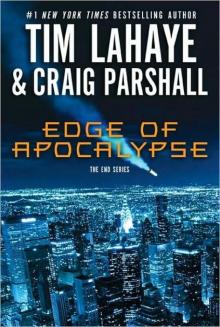 Edge of Apocalypse
Edge of Apocalypse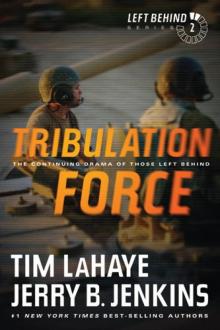 Tribulation Force
Tribulation Force The Left Behind Collection: All 12 Books
The Left Behind Collection: All 12 Books Black Friday
Black Friday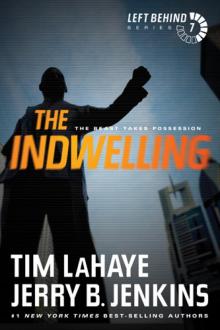 The Indwelling
The Indwelling The Left Behind Collection
The Left Behind Collection